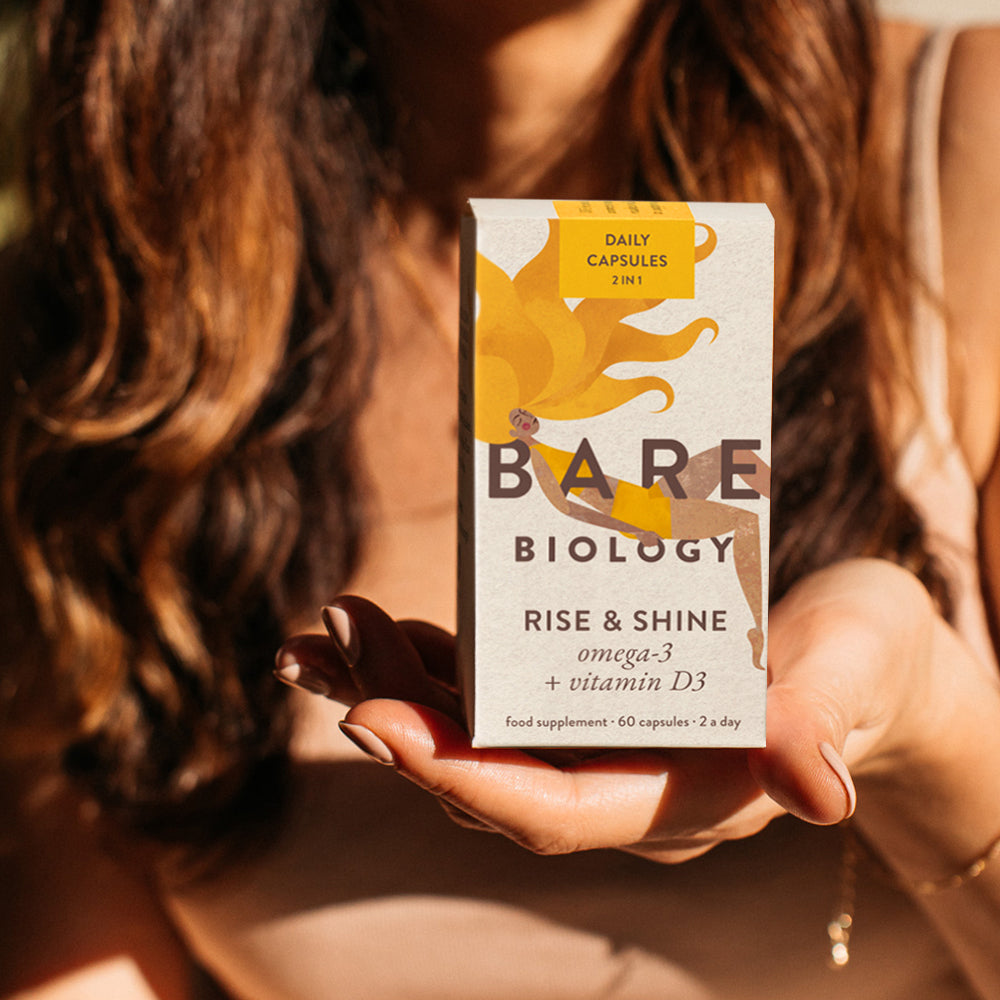Should I take Vitamin D & K2 together?
CONTENTS
Best sources of Vitamin D and K2
How to choose the best Vitamin D and K2 supplement?
Should Vitamin D and K2 be taken together?
The benefits of Vitamin D and K2 for cardiovascular health
The benefits of Vitamin D and K2 for immune system health
How much Vitamin D and K2 should I take daily?
What is Vitamin D and K2?
Over the past few years, vitamin D has probably been one of the most talked about supplements, and we all know it plays a vital role in supporting our immune system and helping us fight infections. But despite its time in the spotlight, vitamin D deficiency is still a real issue in the UK. If you've ever bought a vitamin D supplement, you'll have noticed it often comes bundled with vitamin K2. So let's have a closer look at why they go hand in hand so well and why they're both essential for good health.
Vitamin D
Historically it was believed vitamin D's only role was maintaining normal calcium levels in our blood and supporting bone health. It does this by ensuring we absorb as much calcium as possible from the food we eat, and if our calcium levels get too low, it'll prompt the release of some from our bones. Calcium isn't just about bone health, though. It's involved in many essential processes in the body, like helping muscles contract and maintaining a normal heart rhythm. However, we now know there are vitamin D receptors in almost all cells and tissues throughout the body, which means they need it to function. So vitamin D plays a role in many processes in our body, supporting not just our bones but also our brain, cardiovascular and immune health.
Vitamin D levels must be very low to develop conditions that manifest in soft bones, such as rickets (in children) or osteomalacia (in adults). However, sub-optimal levels are associated with other conditions such as fatigue, poor skin health, insomnia, joint and muscle pain, low mood, and trouble concentrating.
Vitamin K
There are two types of vitamin K. Vitamin K1 comes mainly from green leafy plants, whereas K2 is mostly of bacterial origin. It can even be produced by our ever-helpful gut bacteria, though there is some debate about whether our bodies can use what they produce.
K1 is primarily involved in blood clotting, but K2 does much more. It protects against heart disease, improves insulin sensitivity, and supports healthy brain function and bone health. It also has anti-inflammatory and antioxidant properties.
Related Products

Best sources of Vitamin D and Vitamin K2
There are very few non-fortified food sources of vitamin D3. They include:
- Fatty fish, e.g. sardines, salmon, mackerel
- Shitake mushrooms, especially if sun-dried
- Egg yolks
- Beef Liver
So we can get a small amount from our diet, but not enough to maintain optimal levels. Healthy sun exposure or supplementation is the only way to make up that balance.
There are different forms of vitamin K2, the most researched being MK-4 and MK-7. The richest food sources of K2 include:
- Natto, a Japanese fermented soybean dish (an acquired taste!). Rich in MK-7, this has by far the highest levels of vitamin K2 out of any foodstuff.
- Cheeses: K2 levels depend on the fermentation process and bacterial strains used. The Norwegian cheese Jarlsberg has one of the highest levels among cheeses.
- Sauerkraut and other fermented products.
Smaller amounts are found in:
- Butter
- Free-range egg yolk
- Grass-fed/outdoor-raised meat products

How to choose the best Vitamin D and K2 supplement
There are two types of supplemental vitamin D: D2 and D3, both of which can raise our vitamin D status.
Vitamin D3 is the most easily absorbed by the body, but bear in mind, if you follow a plant-based diet, most available D3s are made from animal by-products. However, some are derived from lichen. D2 is always vegan.
And when you're looking at which form of vitamin K it's combined with, K2 (MK-7), derived from natto, is the form the body uses most efficiently. On the other hand, MK-4 is absorbed very quickly and may be better at reaching tissues that MK-7 doesn't, but research is ongoing in this area.
Liquids or sprays offer ease of use and flexibility when it comes to dosing and can be taken sublingually (under the tongue), which means they're absorbed and put to use more quickly.

Should Vitamin D and K2 be taken together?
When it comes to how our bodies use calcium, vitamin D and K2 are the star players. Alongside some other minerals, needed in much smaller quantities, these two work in tandem, utilising calcium to support healthy bones and heart health. They need each other to do their jobs properly.
In short, vitamin D helps extract calcium from our food, and K2 helps deposit it where we need it: in bones and teeth and not in soft tissues such as artery walls and cartilage, which could lead to heart disease. These two vitamins appear more valuable for supporting bone and heart health when taken together rather than alone.
Although there is not yet any evidence to suggest taking vitamin D without K2 might be harmful, we do know low levels of vitamin K2 are associated with the calcification, or hardening, of our arteries and increased risk of heart disease. We also know extremely high levels of vitamin D can lead to high levels of calcium in the blood, particularly if our vitamin K levels are low, increasing the risk of heart disease. So if you're supplementing your vitamin D levels, it makes sense to include some K2.
In addition, they both support skin health: vitamin K2 by helping to maintain elasticity, and vitamin D due to its anti-inflammatory nature. They also both play essential roles in supporting our cardiovascular and immune health.
The benefits of Vitamin D and K2 for cardiovascular health
Healthy vitamin D3 and K2 levels are associated with heart and metabolic health benefits.
They both play a role in improving how our body responds to insulin and how much we produce, thus reducing the risk of developing type two diabetes, a significant risk factor for inflammation and cardiovascular disease.
Vitamin D and cardiovascular health
In the 1980s, it was discovered the tissue in our heart and blood vessels contains vitamin D receptors. And we now know vitamin D deficiency to be associated with arterial stiffness and high blood pressure. Both conditions are pro-inflammatory and are considered two significant contributors to heart disease.
Vitamin K2 and cardiovascular health
The amount of calcium in your arteries is considered a reliable predictor of heart disease. Our arteries carry oxygen-rich blood from the heart to the rest of the body. When they become damaged due to poor diet or lifestyle choices, plaques form on the arterial lining as an attempt at repair. These plaques are formed partly of calcium, and over time they get bigger, causing an increase in blood pressure and less flexible arteries, both risk factors for cardiovascular disease.
Proteins in the body, known as GLA proteins, inhibit this process and are dependent on the presence of vitamin K2.


The benefits of Vitamin D and K2 for immune system health
Inflammation is a normal immune system response triggered by damage caused by injury, infection or toxins. Short-term inflammation is essential for healing, but chronic inflammation is the root of many serious conditions. Both vitamin D and K2 have anti-inflammatory effects and support the immune system in a regulatory role.
Vit D plays a role in developing dendritic and natural killer cells. Both are specialised immune cells and essential players in our first line of defence against potential invading pathogens. Natural killer cells also suppress autoimmune diseases.
The development of autoimmune conditions is never down to just one trigger. The environment, gut health and genetics are three big areas to consider. But vitamin D may provide just one piece of the puzzle, as low levels are a possible risk factor for certain autoimmune conditions.
Newer research indicates there may also be an association between vitamin K2 and autoimmune diseases. A recent study indicated K2 might have an immunosuppressive effect, as it positively affected inflammatory markers associated with rheumatoid arthritis.
Vitamin D and immune system health
Many of our immune cells contain vitamin D receptors. Once bound onto these receptors, vitamin D stimulates the production of two peptides (short chains of amino acids) known as cathelicidin and β defensin-2. Both are considered antimicrobial, potentially keeping harmful bacteria at bay. They also play a role in autophagy, a natural process that removes or recycles damaged cells or bits of cells we no longer need.
Vitamin K2 and immune system health
Although there is still much to discover, we know MK-7 reduces markers of low-grade inflammation associated with plaque formation and damage to the lining of our blood vessels.
It also calms the T-cell response during an immune reaction. An overzealous T-cell reaction is associated with the development of autoimmune conditions.

How much Vitamin D and K2 should I take daily?
So how do our levels get below optimal? Vitamin D deficiency could be a combination of inadequate sun exposure, overuse of sunscreen, and our indoor lifestyle. Older people, those with darker skin and anyone with fat malabsorption issues such as Crohn's or Coeliac may also find it harder to achieve optimal levels. And our vitamin K2 levels may not be up to scratch simply because we don't include enough food sources in our diet.
The UK government advises all adults and children over four years old to supplement with 400IU of vitamin D per day from October through to March as our winter sun in the UK is not strong enough for us to make our own. In addition, it's recommended we shouldn't exceed supplemental doses of 4000IU per day and should maintain a blood level of at least 50 nmol/l.
Vitamin D & K2 combination side effects
Both vitamin D and K2 have an excellent safety profile and are well-tolerated when taken in moderate amounts. However, some people have reported having an upset stomach after taking K2.
Due to the role of vitamin K in blood clotting, those taking blood thinning medications are advised to avoid supplementation, as vitamin K might reduce the drug's effect.
If you take any medications, it's always a good idea to talk to your health practitioner before starting any new supplement.

What about Vitamin D and Fish Oil?
As a food, oily fish provide us with a rich source of vitamin D. However, during the gentle and careful extraction of omega-3 oils for nutritional supplements, the vitamin D gets left behind.
Found together in nature, fish oils and vitamin D are perfect partners that nutritionally complement each other. They work together to support mood regulation, cognitive performance, immune resilience, cardiovascular health, as well as strong bones and joints (to name a few). So taking a vitamin D supplement, like Beam & Balance, alongside omega-3 is a great way to reunite these potent and powerful nutrients that play a pivotal role in our health, across all developmental stages and phases of life.
As a handy two-in-one option, Rise & Shine offers 1,600mg total omega-3, including 1,035mg EPA and 470mg DHA, along with 1,000 IU vitamin D3 per daily dose (2 caps).
This formulation doesn’t contain any K2, as the dose of D3 isn’t high enough to require the two together. This vit D dose is great for general maintenance as long as you’re not deficient. If your levels are low, Beam & Balance will top up your vitamin D more quickly.







